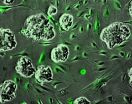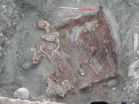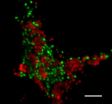(Press-News.org) A team of 17 researchers, led by scientists Eduard Batlle and Elena Sancho in the Colorectal Cancer Laboratory at the Institute for Research in Biomedicine (IRB Barcelona), have determined that the ability of colon cancer to metastasize lies in the healthy cells, called stroma, that surround the tumour. Although the stroma has long been hypothesized to be complicit in this process, this study marks the first time that healthy cells in the microenvironment have been observed to play a fundamental role in allowing metastasis to occur in a specific tumour type.
The discovery, which will be tomorrow's Cancer Cell cover story, could translate into direct benefits for patients given that in a little more than five years, tests could be available to predict relapse allowing doctors to target treatment according to prognosis. IRB Barcelona Group Leader Eduard Batlle, ICREA researcher and recipient of an ERC Starting Grant and the Banco Sabadell Biomedical Research Prize, and Associate Researcher Elena Sancho, presented their results at a press conference held during the Barcelona BioMed Conference on "Normal and Tumour Stem Cells", organized by IRB Barcelona and the BBVA Foundation at the Institute d'Estudis Catalans.
Tumour stem cells corrupt healthy cells in tumour microenvironment
By studying 345 cases of colon cancer, using information in public databases and samples of patients provided by three hospitals in Barcelona, the team was able to identify the factors key to colon cancer metastasis. They showed that when tumour stem cells reach the liver, a common target of colon cancer metastasis, they release a molecule called TGF-beta into the microenvironment. The surrounding cells, including macrophages, leukocytes, fibroblasts and endothelial cells, respond by releasing a different set of molecules. The researchers found that the cells in the tumour microenvironment produce interleukin-11 (IL11) and cause a series of genetic changes in the tumour stem cells that allow it to survive in the foreign organ.
"This study proposes a change in paradigm", explains Batlle. "Until now, if we wanted to know whether a colon cancer patient was likely to develop metastasis, we would look at their tumour cells. This study has shown us that, instead of looking at the seed, we need to be looking at the earth. We can predict if a plant will grow if the ground, or substrate, in which the seed is planted is fertilized. TGF-beta is the fertilizer that changes the earth in which the tumour seed grows."
The scientists also observed that tumour cells in the original organ already possess the ability to change their microenvironment. "We can tell whether there will be metastasis through indirect means. If we see that the stroma is already modified in the primary tumour site in the colon, it means that the tumour cells will also be able to change the microenvironment when they disseminate to the liver," explains Alexandre Calon, a French postdoctoral fellow in Batlle's lab and first author of the study.
A test to predict relapse ready in five years
Colon cancer is the second cause of cancer deaths worldwide. Current treatment normally combines surgery and chemotherapy. After intervention, patients normally go into remission, which can last months or years. 30-40% will relapse, mostly in the form of metastasis primarily to the liver or to the lung. Elena Sancho explains that "in about five years, we will likely have a test on the market that identifies those patients at risk of metastasis, allowing doctors to fine tune their treatment regimes."
The scientists have observed that about 15% of patients never develop metastasis and this is related to whether or not the stroma has been modified by TGF-beta. This means that armed with a diagnostic test that analyzes the genetic signature of the stroma (whether or not molecules including TGF-beta and interleukin-11 are present), doctors may be able to identify patients at risk of developing metastasis. If the data from this study are confirmed, between 10-15% of patients may no longer require chemotherapy, leading to direct benefits for their health and to a better use of resources. On the other hand, if the test predicts a high risk for metastasis, patients would be able to receive more aggressive treatment and undergo more thorough monitorization.
Validation of scientific results and future treatment for metastasis
The team of researchers also show in the Cancer Cell article that metastasis can be prevented from occurring by eliminating the TGF-beta signal in the stroma. They treated mice with aggressive colon tumours with a TGF-beta inhibitor that is already in clinical trials for other illnesses. Their tumours did not metastasize. "This experiment proves that TGF-beta and the tumour stroma must 'speak to each other' in order for metastasis to occur. Our results in mice also show that patients with activated TGF-beta, and who are in the initial phases of the disease, may benefit from taking a TGF-beta inhibitor", explains Batlle.
As far as the researchers can tell, dependence on TGF-beta is limited to the initial phases of metastasis. Once metastasis takes hold in the foreign organ, the administration of the inhibitor is no longer effective. "Even so, we must point out", says Batlle, "that the development of a drug to treat colon cancer metastasis is a complicated process." Today, the vast majority of inhibitors must first be tested in patients with irreversible prognosis. Clinical trials are designed to slow down tumour growth, while the molecules that we administered to mice don't act on tumour growth but at an earlier step. We have presented our evidence in this article, and we open the door to a future development of a TGF-beta based inhibitor".
This study was made possible thanks to the collaboration of physicians at the Hospital Clinic of Barcelona, the Hospital del Mar, the Hospital de Sant Pau and the group of researchers at the Memorial Sloan Kettering Cancer Center led by Joan Massagué. Massagué, who is also adjunct director of IRB Barcelona and fosters the research on cancer metastasis in the center, participated in the study as an expert on metastasis and TGF-beta.
Other collaborators in the study include David Rossell, Head of the Biostatistics and Bioinformatics Unit at IRB Barcelona, who played a key role in making sense of the enormous amount of genomic data generated in the study, as well as the team of chemist Antoni Riera, also from IRB Barcelona, who contributed work on the TGF-beta inhibitor.
INFORMATION:
Reference article:
Dependency of Colorectal Cancer on a TGF-beta-Driven Program in Stromal Cells for Metastasis Initiation
Alexandre Calon, Elisa Espinet, Sergio Palomo-Ponce, Daniele V.F. Tauriello, Mar Iglesias, María Virtudes Céspedes, Marta Sevillano, Cristina Nadal, Peter Jung, Xiang H.-F. Zhang, Daniel Byrom, Antoni Riera, David Rossell, Ramon Mangues, Joan Massagué, Elena Sancho, Eduard Batlle.
Cancer Cell (2012). November 13th (print issue)
KEY CONCEPTS IN STUDY
Tumour stem cells
Not all tumour cells have the same properties. Many of them, although they are tumour cells, only serve to form the mass of the tumour. There exists a hierarchy within the different types of tumour cells, at the top of which are stem cells. These cells have the ability to regenerate a tumour and cause metastasis in a distant organ.
Stroma
Stroma is the microenvironment that surrounds tumour cells. Stroma is formed by different types of cells that are recruited by cancer cells, and include: endothelial cells: – flat cells that cover the inside of blood vessels; macrophages – cells with immunological capacities that serve to clean and protect tissues; fibroblasts – cells within tisúes reponsible for synthesizing the components of the matrix; leukocytes – immune response blood cells responsible for defending an organism against foreign substances or infectious agents.
Tumours are able to alter the function of these cells for their own benefit. In this study, the researchers discovered the fundamental role that the stroma plays in allowing tumour cells from the colon to cause a metastasis in the liver.
TGF-beta
Transforming growth factor-beta. TGF-beta is a protein that controls proliferation (growth and cell division) and cell differentiation (the specialization of a cell into a specific type) in most cells. It is a type of cytokine that is associated with immune system deficiencies, cancer, heart disease, diabetes, Parkinsons, Marfan syndrome, Loeys-Diets syndrome and AIDS.
One of the leading experts on TGF-beta is Joan Massagué. The IRB Barcelona adjunct director is recognized internationally for having described the signalling cascade of this protein and created the basis for studying its deregulation in disease.
The deregulation of TGF-beta can result in tumour development. TGF-beta acts as a tumour suppressor that malignant cells must evade in order to maintain their malignancy. TGF-beta also alters processes such as cell invasion, immune system regulation, and modification of the microenvironment that malignant cells can exploit to their own benefit. In 2008, Joan Massagué determined the key role that TGF-beta plays in allowing breast cancer cells to metastasize. This study, which included the participation of IRB Barcelona, showed that TGF-beta causes changes in tumour cells that allows them to break free from the primary organ and enter the blood stream. The study showed that TGF-beta corrupts the tumour stroma so that it helps the tumour to metastasize.
Interleukin-11
Interleukin-11 is a protein produced by the stroma cells. The study by Batlle and Sancho in Cancer Cell assigns it a fundamental role in the modification of tumour cells. Thanks to the interleukin-11 signal, tumour cells can activate a series of genes that allow the cells to survive in a hostile organ during metastasis. Without interleukin-11, the tumour cells that have spread to other organs will die before being able to produce the metastasis.
Metastasis
Metastasis is the process by which tumour cells are able to generate new tumours in distant organs. Colon cancer tends to metastasize to the liver and lung.
Right from the earliest stages, tumours release cells that have the potential to cause metastasis into the blood stream. Metastasis is an inefficient process, hoever, given that only a very small number of cells are able to survive the trip to a distant organ (organisms have many defense mechanisms), and because the new organ provides a hostile environment. Unfortunately, when metastasis occurs, prognosis for the patient is poor. Epidemiologists estimate that 90% of deaths by cancer are caused by metastasis.
Scientists at IRB BARCELONA discover a key process that allows colon cancer to metastasize
The study, published in the prestigious journal Cancer Cell, reveals that tumour cells of the colon must form alliances with healthy cells in order to colonize other organs during metastasis
2012-11-12
ELSE PRESS RELEASES FROM THIS DATE:
Statement on the handling of risk situations by scientists
2012-11-12
In late October, Italian scientists have been sentenced for supposedly not having warned sufficiently against the severe earthquake of L'Aquila 2009. On occasion of this verdict, the German National Academy of Sciences Leopoldina and the French Académie des sciences publish a statement concerning the handling of risks situations by scientists. We forward the statement in the exact wording.
Joint Statement of the German National Academy of Sciences Leopoldina and the French Académie des sciences, 12 November 2012
On the science-based communication of risks following ...
Mongolia and the Altai Mountains: Origins of genetic blending between Europeans and Asians
2012-11-12
A group of researchers led by the Universitat Autònoma de Barcelona (UAB) has discovered the first scientific evidence of genetic blending between Europeans and Asians in the remains of ancient Scythian warriors living over 2,000 years ago in the Altai region of Mongolia. Contrary to what was believed until now, the results published in PLoS ONE indicate that this blending was not due to an eastward migration of Europeans, but to a demographic expansion of local Central Asian populations, thanks to the technological improvements the Scythian culture brought with them.
The ...
Elsevier launches new journal: 'Health Care: The Journal of Delivery Science and Innovation'
2012-11-12
New York, November 12, 2012 – Elsevier, a world-leading provider of scientific, technical and medical information products and services, is pleased to announce the launch of Health Care: The Journal of Delivery Science and Innovation.
Health Care provides a vehicle for communicating important advances in the study of cutting edge research on innovation in health care delivery, including improvements in systems, processes, management, payment, and applied information technology. The United States health care system is undergoing unprecedented reform; Health Care builds ...
Call for global monitoring of infectious diseases in dogs and cats
2012-11-12
Most emerging infectious diseases of humans come from animals. International health agencies monitor these diseases, but they do so only for humans and livestock, not for companion dogs and cats. A new study recommends a global system is needed to monitor infectious diseases of companion dogs and cats.
The study, led by Michael Day, Professor of Veterinary Pathology in the School of Veterinary Sciences at the University of Bristol and published online in Emerging Infectious Diseases, lists key infectious diseases that may be transmitted between dogs and cats and man ...
At least 6 major earthquakes on the Alhama de Murcia fault in the last 300,000 years
2012-11-12
Enjoying Spanish participation, an international group of researchers have analysed the most recent history of the Alhama de Murcia fault. They discovered that it has experienced six major earthquakes above 7 on the Richter scale. According to the scientists, this provides "convincing evidence" that the maximum earthquake magnitudes in the area are higher than originally thought.
Since 2001, researchers from the Universities of Barcelona, Leon, Complutense de Madrid (UCM), Coimbra (Portugal), Aahus (Denmark) and the National Autonomous University of Mexico have been working ...
Scientists unravel the mystery of marine methane oxidation
2012-11-12
This press release is available in German.
Microbiologists and geochemists from the Max Planck Institute for Marine Microbiology, along with their colleagues from Vienna and Mainz, show that marine methane oxidation coupled to sulfate respiration can be performed by a single microorganism, a member of the ancient kingdom of the Archaea, and does not need to be carried out in collaboration with a bacterium, as previously thought. They published their discovery as an article in the renowned scientific journal Nature.
Vast amounts of methane are stored under the ocean ...
Obesity epidemic threatens health of all social groups equally
2012-11-12
It is often assumed that those on low incomes and with low levels of education are overly represented in the major increase in obesity of recent decades.
A new thesis from the Lund University School of Economics and Management, Sweden, shows that obesity is increasing across all social groups and that we need to look at factors other than socioeconomic status to understand and solve one of the major public health concerns of the Western world.
Åsa Ljungvall, a researcher in economics at the Lund University School of Economics and Management, has studied the increase ...
Smart drug improves survival in older patients with acute myeloid leukemia
2012-11-12
A new study has found Acute Myeloid Leukaemia (AML) patients given a new type of 'smart drug' in addition to chemotherapy treatment are 22 per cent less likely to relapse and around 13 per cent less likely to die from their disease. The results are from a major phase III Cancer Research UK-funded trial led by Cardiff University.
Of the 1,115 patients who took part in the trial, 68 per cent relapsed on the new treatment within three years, compared with 76 per cent of those who had the standard treatment. And 25 per cent were still alive after three years, compared with ...
Place in the sun carries risks for outdoor workers
2012-11-12
Those individuals who work outdoors with resultant sun exposure are at increased risk for non-melanoma skin cancers, such as squamous cell carcinoma and basal cell carcinoma. Manigé Fartasch shows that the connection between occupational UV exposure and squamous cell carcinoma is now well-established in her review article in issue 43 of Deutsches Ärzteblatt International (Dtsch Arztebl Int 2012; 109(43): 715−20).
The results are less clear for basal cell carcinoma, another form of non-melanoma skin cancer. Skin cancers caused by UV light have not yet been considered ...
The consequences of late preterm birth
2012-11-12
Delivery at any time before the 39th week of gestation increases the risk of postnatal problems and mortality. A team of authors headed by Christian F. Poets has analyzed mortality and morbidity data from epidemiological studies of infants born between two and six weeks preterm, comparing them with infants born at full term. They present their findings in issue 43 of Deutsches Ärzteblatt International (Dtsch Arztebl Int 2012; 109(43): 721−6).
As a rule, elective Cesarean sections are performed somewhat before full term, in order to prevent spontaneous delivery. However, ...
LAST 30 PRESS RELEASES:
$3 million NIH grant funds national study of Medicare Advantage’s benefit expansion into social supports
Amplified Sciences achieves CAP accreditation for cutting-edge diagnostic lab
Fred Hutch announces 12 recipients of the annual Harold M. Weintraub Graduate Student Award
Native forest litter helps rebuild soil life in post-mining landscapes
Mountain soils in arid regions may emit more greenhouse gas as climate shifts, new study finds
Pairing biochar with other soil amendments could unlock stronger gains in soil health
Why do we get a skip in our step when we’re happy? Thank dopamine
UC Irvine scientists uncover cellular mechanism behind muscle repair
Platform to map living brain noninvasively takes next big step
Stress-testing the Cascadia Subduction Zone reveals variability that could impact how earthquakes spread
We may be underestimating the true carbon cost of northern wildfires
Blood test predicts which bladder cancer patients may safely skip surgery
Kennesaw State's Vijay Anand honored as National Academy of Inventors Senior Member
Recovery from whaling reveals the role of age in Humpback reproduction
Can the canny tick help prevent disease like MS and cancer?
Newcomer children show lower rates of emergency department use for non‑urgent conditions, study finds
Cognitive and neuropsychiatric function in former American football players
From trash to climate tech: rubber gloves find new life as carbon capturers materials
A step towards needed treatments for hantaviruses in new molecular map
Boys are more motivated, while girls are more compassionate?
Study identifies opposing roles for IL6 and IL6R in long-term mortality
AI accurately spots medical disorder from privacy-conscious hand images
Transient Pauli blocking for broadband ultrafast optical switching
Political polarization can spur CO2 emissions, stymie climate action
Researchers develop new strategy for improving inverted perovskite solar cells
Yes! The role of YAP and CTGF as potential therapeutic targets for preventing severe liver disease
Pancreatic cancer may begin hiding from the immune system earlier than we thought
Robotic wing inspired by nature delivers leap in underwater stability
A clinical reveals that aniridia causes a progressive loss of corneal sensitivity
Fossil amber reveals the secret lives of Cretaceous ants
[Press-News.org] Scientists at IRB BARCELONA discover a key process that allows colon cancer to metastasizeThe study, published in the prestigious journal Cancer Cell, reveals that tumour cells of the colon must form alliances with healthy cells in order to colonize other organs during metastasis




